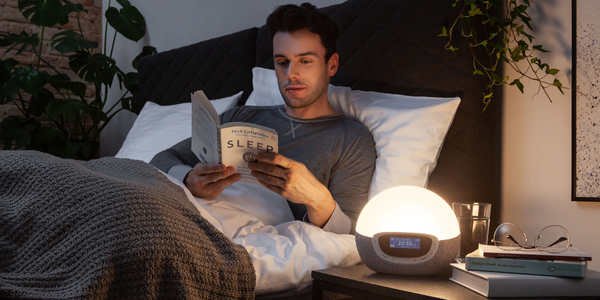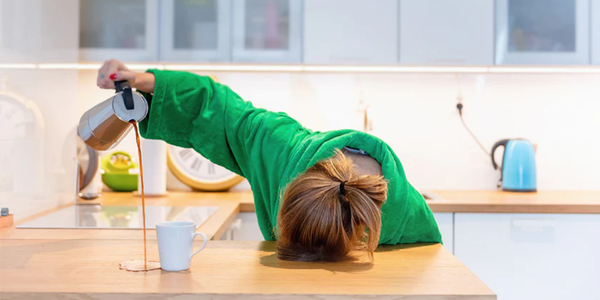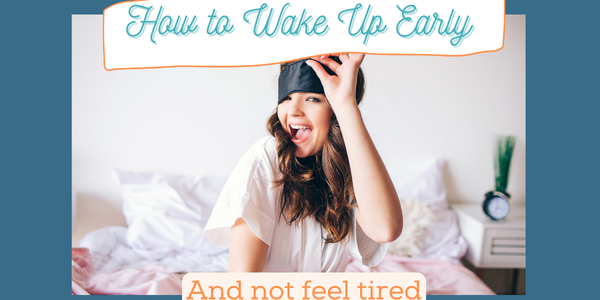How to Wake Up Early and Not Feel Tired
You finally set your alarm for 5:30 AM, vowing to become a morning person. But when it rings, your body protests, your mind fogs, and the snooze button becomes your best friend. Sound familiar?
If you’re wondering how to wake up early and not feel tired, you’re not alone. Many of us crave the productivity and peace of early mornings, but few manage to make it sustainable. The good news? It’s absolutely possible—with the right strategies, mindset, and consistency.
This guide will walk you through science-backed methods and real-life routines that’ll transform your mornings from sluggish to supercharged.
Why Do We Feel Tired in the Morning?
Before we fix the problem, let’s understand it. Morning tiredness is usually a result of:
-
Poor sleep quality or quantity
-
Irregular sleep schedules
-
Disruptive bedtime habits (hello, scrolling TikTok at midnight)
-
Sleep inertia – that groggy feeling after waking from deep sleep
-
Lack of morning light or movement
Addressing these issues is the foundation for waking up refreshed.
The Science of Sleep: Know Your Circadian Rhythm
Your body runs on a natural clock called the circadian rhythm, which regulates sleep, alertness, and even hormone production. Disrupting this rhythm—like staying up late or waking up at different times every day—leads to grogginess and fatigue.
To wake up early and feel alert, align your routine with your circadian rhythm. That means:
-
Going to bed and waking up at the same time every day
-
Getting morning sunlight to reset your internal clock
-
Avoiding screens before bed that confuse your brain’s sense of night and day

Step-by-Step Guide: How to Wake Up Early and Not Feel Tired
1. Set a Realistic Wake-Up Goal
Don’t go from 9 AM to 5 AM in one night. Gradually shift your wake-up time in 15–30 minute increments over several days.
Real-world example: If you usually wake up at 8 AM, aim for 7:45 AM tomorrow, then 7:30 the next day. Your body adjusts best with small, consistent changes.
2. Create a Sleep-Friendly Evening Routine
A great morning starts the night before.
Try These Evening Habits:
-
Wind down 60 minutes before bed: Dim lights, silence notifications, avoid work or stress.
-
No screens 30–60 minutes before sleep: Blue light disrupts melatonin production.
-
Take a warm shower or bath: It triggers a natural drop in body temperature, signaling sleep.
-
Use sleep cues: Scented candles, soft music, or a sleep podcast train your brain for bedtime.
3. Optimize Your Sleep Environment
Your bedroom should be a sleep sanctuary, not a second office.
Make These Changes:
-
Keep it cool: 60–67°F (16–19°C) is optimal.
-
Block light: Use blackout curtains or an eye mask.
-
Minimize noise: Try white noise machines or earplugs.
-
Invest in comfort: A good mattress and pillow can make all the difference.

4. Wake Up the Right Way
Avoid shocking your system awake. Instead, use gentle methods to transition out of sleep.
Try These Wake-Up Tactics:
-
Use a sunrise alarm clock: Mimics natural light to ease you out of sleep.
-
Expose yourself to sunlight within 10–15 minutes of waking.
-
Stretch or move lightly: A few yoga poses or jumping jacks can kickstart circulation.
-
Hydrate: A glass of water helps flush sleepiness away.
5. Eat a Light, Energizing Breakfast
Your body’s been fasting for 7–8 hours. Refueling with the right food helps wake your brain and stabilize energy levels.
Great Morning Fuel Includes:
-
Protein: Eggs, Greek yogurt, or nuts
-
Complex carbs: Oats, whole grain toast
-
Healthy fats: Avocado, nut butter
-
Hydration: Water, green tea, or a smoothie
Avoid sugary cereals or pastries—they’ll spike and crash your energy.
6. Move Your Body in the Morning
Exercise in the morning releases endorphins and cortisol (the good kind) that help you stay awake, focused, and happy.
-
Start with 5–10 minutes of stretching or walking.
-
Gradually build up to full workouts if desired.
-
Even a few minutes of movement can break up morning grogginess.

7. Be Consistent—Even on Weekends
We know it’s tempting to sleep in on weekends, but consistency is key. Your circadian rhythm thrives on routine.
Pro tip: If you must sleep in, keep it within 60–90 minutes of your usual wake-up time.
Bonus Tips to Wake Up Early and Energized
Avoid Caffeine After 2 PM
Caffeine has a half-life of 5–6 hours. Drinking coffee too late can delay melatonin and ruin your sleep cycle.
Use Melatonin Supplements (With Caution)
Melatonin can help reset your sleep schedule, especially if you’re adjusting to a new routine. Start with 0.5–1mg, 1–2 hours before bedtime.
Consult a healthcare provider if you plan to use it long-term.
Keep a Sleep Journal
Track your bedtime, wake-up time, mood, and energy levels. Patterns will emerge, helping you refine your routine.
Sample Morning Routine for Energy and Focus
Here’s a sample early morning routine you can customize:
| Time | Activity |
|---|---|
| 5:30 AM | Wake up with sunrise alarm |
| 5:40 AM | Drink water, stretch |
| 6:00 AM | 10–20 min light exercise |
| 6:30 AM | Shower and dress |
| 7:00 AM | Eat high-protein breakfast |
| 7:30 AM | Plan your day or journal |

Common Mistakes to Avoid
-
Trying to change too much too fast
-
Using your phone in bed
-
Oversleeping on weekends
-
Skipping breakfast or overloading on sugar
-
Ignoring your body’s sleep signals
Final Thoughts: Your New Morning Starts Tonight
Learning how to wake up early and not feel tired isn’t about willpower—it’s about systems. Small changes, repeated consistently, lead to lasting transformation.
So tonight, start winding down a bit earlier. Tomorrow, let the morning light greet you. Each day, you’ll wake up just a little more refreshed—and before you know it, early rising will feel like second nature.
What’s Your Morning Routine?
We’d love to hear what’s working (or not working) for you. Drop a comment below with your biggest challenge or your favorite tip. Want more productivity and wellness hacks? Check out our related guides on:


